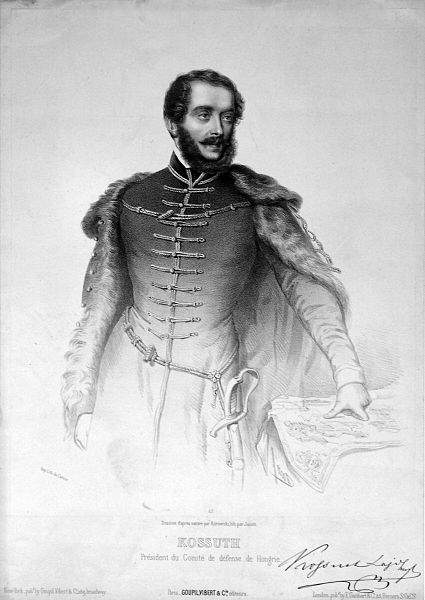Change language:
How one of the greatest Hungarian heroes became stigmatised as a traitor
12th September is a very shameful anniversary in Hungarian history. On this date in 1849, Lajos Kossuth (former Finance Minister and Governor of Hungary) wrote his letter to the Hungarian emissaries of France and England, in which he condemned Artúr Görgei (general and commander in chief of the Hungarian army) for laying down arms and ending the Freedom Fight.
In his exile, Lajos Kossuth stayed for one year in Vidin (Ottoman Empire – today in Bulgaria) after the Habsburg and Russian empires broke down the long-lasting Hungarian Freedom Fight. 170 years ago, he wrote the Letter of Vidin (more like a memorandum). His purpose was to get himself and his escort under English patronage to avoid living as a prisoner on a Turkish Island. At the time, the details of the Hungarian campaigns were not entirely clear in Western-Europe (György Klapka was still holding the fortress of Komárom), so he reported about the events from his point of view.

In the letter, he publicly blamed General Görgei for laying down arms and ending the Freedom Fight against the Habsburg Empire. He accused him of betraying the Hungarian freedom as a coward because he thought that the army would have been capable of continuing the fights – he listed the numbers of the Hungarian forces in the letter and argued for continuing the war of independence.
“Our poor hapless homeland fell. It did not fall because of our enemies’ strength, but because of betrayal and evil. Oh, I lived long enough to see this, and I am still not allowed to die. I elevated Görgei from the dust to gain eternal glory for himself and freedom for his homeland. And yet, he became the executioner of his country instead, like a coward.”
– words of Lajos Kossuth from the letter of Vidin.
Artúr Görgei was one of the greatest generals of Hungarian history. He was commander in chief of the army in the spring of 1849. He led the Hungarian forces against the Habsburgs during the Spring campaign in which he managed to achieve the most glorious series of Hungarian victories over one of the strongest and most modern armies of Europe, and retake Pest-Buda (capital). After that, Francis Joseph (18-year-old Habsburg Emperor), asked for the help of the Russian tsar Nicholas I. Against the combined forces of the two superpowers, the Hungarian army had no chance to defend the country. Görgei tried though but soon, after the battle of Segesvár (31st July) and the decisive defeat at Temesvár (9th August) he realised that there was nothing to achieve anymore. He laid down arms to the Russian army at Világos. He knew that this was the only way to prevent further bloodshed and save as many Hungarian lives as possible.

Photo: honvedelem.hu
Unfortunately, Lajos Kossuth completely misread the situation of Hungary. He believed that Görgei was to blame for giving up freedom and the troops could have continued the fights. The Russian tsar gave Görgei amnesty from respect and did not allow the Habsburgs to have him executed. Instead of becoming a national hero for his great deeds, Gögei was hated and blamed during his life by the Hungarian people who never forgave him for laying down arms, after Kossuth’s unjust letter of Vidin.
If you are interested in the 1848-’49 Hungarian Revolution and Freedom Fight, you can watch some videos about it here.







